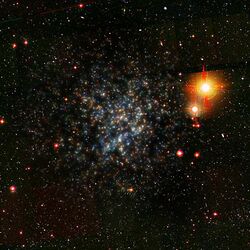Astronomy:Boötes I (dwarf galaxy)
| Boötes Dwarf Galaxy | |
|---|---|
 SDSS image of Boo I | |
| Observation data (J2000 epoch) | |
| Constellation | Boötes |
| Right ascension | 14h 00m 06s[1] |
| Declination | +14° 30′ 00″ ± 15″[1] |
| Distance | 197 ± 18 kly (60 ± 6 kpc)[1] |
| Apparent magnitude (V) | 13.1[a] |
| Characteristics | |
| Type | dSph[1] |
| Apparent size (V) | 26.0′ ± 1.4′[1] |
| Other designations | |
| Boo dSph, Boötes Satellite, Boötes Dwarf Spheroidal Galaxy, Boötes dSph galaxy,[2] PGC 4713553 | |
The Boötes Dwarf Galaxy (Boo I dSph) is a galaxy discovered in 2006, which appears faint, with a luminosity of 100,000 L☉ and an absolute magnitude of –5.8. It lies about 197,000 light-years (60.4 kiloparsecs) away in the constellation Boötes. This dwarf spheroidal galaxy appears to be tidally disrupted[1] by the Milky Way Galaxy, which it orbits, and has two stellar tails that cross over to form a cross.[citation needed] Tidally disrupted galaxies usually only form one tail.[citation needed] The galaxy appears to be significantly elongated, with an ellipticity of ε = 0.68 ± 0.15.[3]
Like many of the ultrafaint dwarf spheroidals, the entire galaxy appears fainter than the Rigel system (absolute magnitude –7.84).[4] Even so, it is one of the more luminous UFDs.[5] It is metal-poor, like other UFDs, with a mean metallicity of −2.34.[5]
The stellar population of Boötes I is mostly very old stars. The two populations have essentially the same age, 13.4 billion and 13.3 billion years, respectively, with most of the stars being of the latter population.[6]
Notes
- ^ Apparent magnitude = Absolute magnitude + Distance modulus = –5.8[1] + 18.9[1] = 13.1
References
- ↑ 1.0 1.1 1.2 1.3 1.4 1.5 1.6 1.7 Belokurov, V.; Zucker, D. B.; Evans, N. W.; Wilkinson, M. I. et al. (2006). "A Faint New Milky Way Satellite in Bootes". The Astrophysical Journal 647 (2): L111–L114. doi:10.1086/507324. Bibcode: 2006ApJ...647L.111B.
- ↑ "NAME Bootes Dwarf Spheroidal Galaxy". SIMBAD. Centre de données astronomiques de Strasbourg. http://simbad.u-strasbg.fr/simbad/sim-basic?Ident=NAME+Bootes+Dwarf+Spheroidal+Galaxy.
- ↑ Longeard, Nicolas; Jablonka, Pascale; Arentsen, Anke; Thomas, Guillaume F.; Aguado, David S.; Carlberg, Raymond G.; Lucchesi, Romain; Malhan, Khyati et al. (2022). "The Pristine dwarf galaxy survey – IV. Probing the outskirts of the dwarf galaxy Boötes I". Monthly Notices of the Royal Astronomical Society 516 (2): 2348–2362. doi:10.1093/mnras/stac1827. Bibcode: 2022MNRAS.516.2348L.
- ↑ Shultz, M.; Wade, G. A.; Petit, V.; Grunhut, J.; Neiner, C.; Hanes, D.; MiMeS Collaboration (2014). "An observational evaluation of magnetic confinement in the winds of BA supergiants". Monthly Notices of the Royal Astronomical Society 438 (2): 1114. doi:10.1093/mnras/stt2260. Bibcode: 2014MNRAS.438.1114S.
- ↑ 5.0 5.1 Jenkins, Sydney A.; Li, Ting S.; Pace, Andrew B.; Ji, Alexander P.; Koposov, Sergey E.; Mutlu-Pakdil, Burçin (2021). "Very Large Telescope Spectroscopy of Ultra-faint Dwarf Galaxies. I. Boötes I, Leo IV, and Leo V". The Astrophysical Journal 920 (2): 92. doi:10.3847/1538-4357/ac1353.
- ↑ Brown, Thomas M.; Tumlinson, Jason; Geha, Marla; Simon, Joshua D.; Vargas, Luis C.; Vandenberg, Don A.; Kirby, Evan N.; Kalirai, Jason S. et al. (2014). "The Quenching of the Ultra-Faint Dwarf Galaxies in the Reionization Era". The Astrophysical Journal 796 (2): 91. doi:10.1088/0004-637X/796/2/91. https://authors.library.caltech.edu/53098/.
External links
- The Universe within 500,000 light-years The Satellite Galaxies (Atlas of the Universe)
- Two New Galaxies Orbiting the Milky Way (Ken Croswell) April 19, 2006
- Strange satellite galaxies revealed around Milky Way Kimm Groshong (New Scientist) 17:00 24 April 2006
- New Milky Way companions found: SDSS-II first to view two dim dwarf galaxies (SDSS) May 8, 2006
- Astronomers Find Two New Milky Way Companions (SpaceDaily) May 10, 2006
- Boötes Dwarf Galaxy at Constellation Guide
Coordinates: ![]() 14h 00m 06s, +14° 30′ 00″
14h 00m 06s, +14° 30′ 00″


